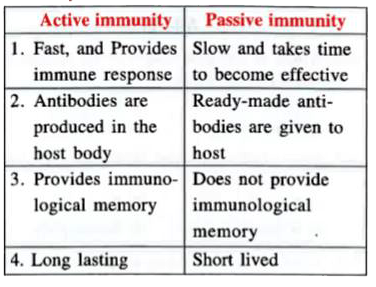The term 'active immunity' means
resistance developed before disease
resistance developed after disease
increased heart beat
increased flow of blood
The correct Answer is:B
Step-by-Step Solution:
1. Understanding Immunity: Begin by recognizing that immunity is the body's ability to resist infections and diseases. There are two main types of immunity: active and passive immunity.
2. Definition of Active Immunity: Active immunity refers to the process where the body produces its own antibodies in response to an antigen. This can occur naturally when the body is exposed to a pathogen, or artificially through vaccination.
3. Mechanism of Active Immunity: When an antigen enters the body (either through infection or vaccination), the immune system recognizes it as foreign. This triggers the immune response, leading to the production of antibodies specific to that antigen.
4. Role of Memory Cells: After the initial exposure to the antigen, the immune system creates memory cells. These cells "remember" the specific antigen, allowing for a quicker and more effective response if the body encounters the same pathogen again in the future.
5. Timing of Resistance Development: It is important to note that active immunity develops after exposure to the antigen, either through natural infection or vaccination. This means the body does not have immediate resistance before encountering the disease.
6. Conclusion: Therefore, the term 'active immunity' means the immunity that is developed by the body through the synthesis of antibodies in response to antigens, leading to long-lasting protection due to the presence of memory cells.
Topper's Solved these Questions
- HUMAN HEALTH AND DISEASEBOOK - DINESH PUBLICATION ENGLISHCHAPTER - HUMAN HEALTH AND DISEASEEXERCISE - CHECK YOUR GRASP
17 Videos
- HUMAN HEALTH AND DISEASEBOOK - DINESH PUBLICATION ENGLISHCHAPTER - HUMAN HEALTH AND DISEASEEXERCISE - CHECK YOUR GRASP
17 Videos
- HUMAN EVOLUTIONBOOK - DINESH PUBLICATION ENGLISHCHAPTER - HUMAN EVOLUTIONEXERCISE - Brain Teasers-VII
181 Videos
- HUMAN REPRODUCTIONBOOK - DINESH PUBLICATION ENGLISHCHAPTER - HUMAN REPRODUCTIONEXERCISE - MCQ
770 Videos
Similar Questions
Differentiate between active immunity and passive immunity.
View SolutionDifferentiate between active immunity and passive immunity.
View SolutionWhich of the following is not a correct difference between active immunity and passive immunity

View SolutionThe term 'immunity' refers to
View SolutionDifferentiate between active immunity and passive immunity. Give any one example where passive immunisation is needed.
View SolutionActive immunity is due to
View SolutionActive immunity is due to
View SolutionAll of the following statements are correct about active immunity, except
View SolutionActive immunity is obtained by
View SolutionThe term 'activation' is usually applied to enzyme activation. What does enzyme activation mean? Does the term relate to energy of activation? Explain.
View Solution
